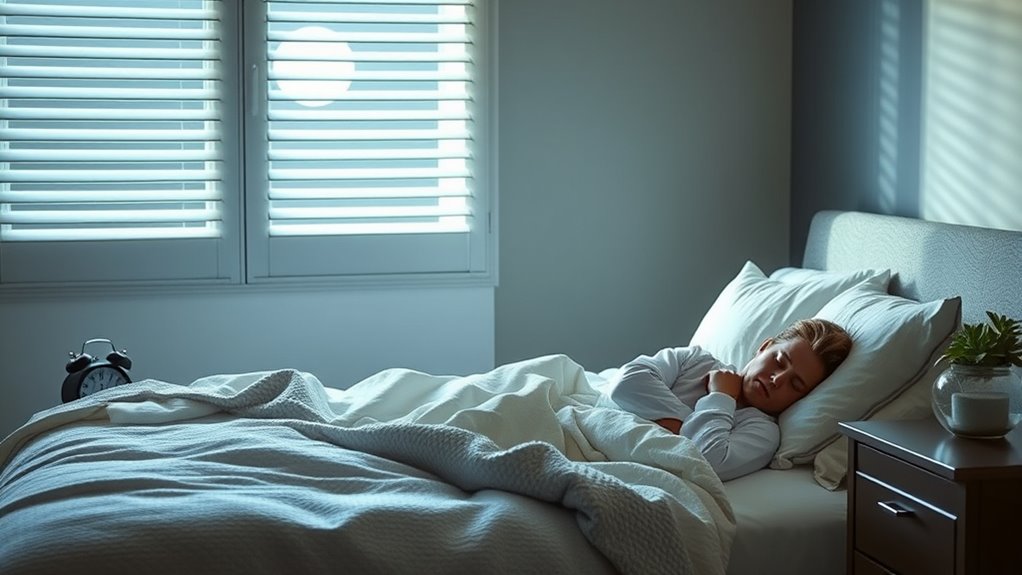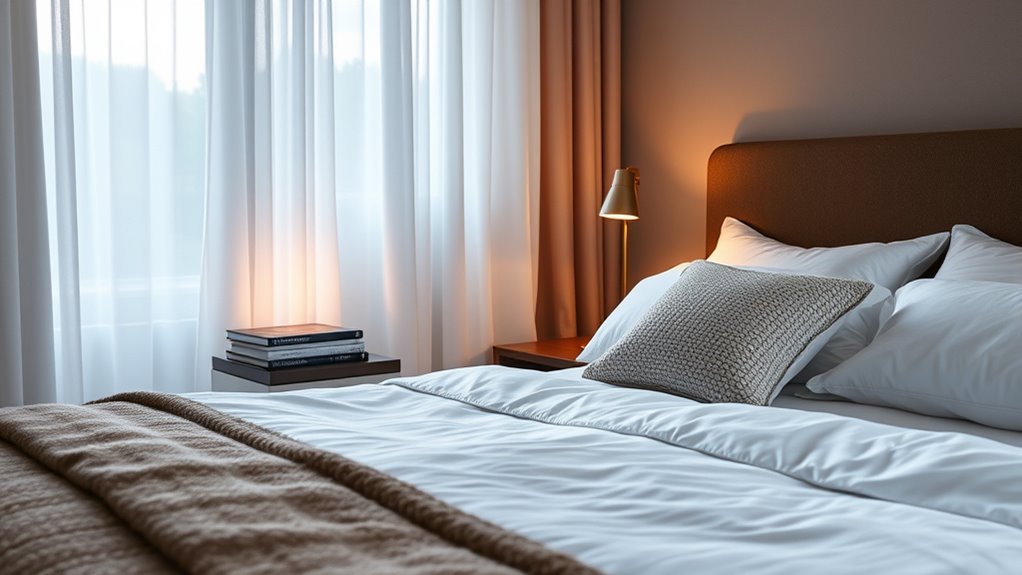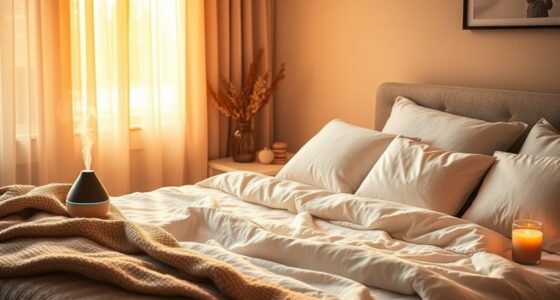To get 7–8 hours of quality sleep each night, establish a calming bedtime routine like reading or gentle stretches, and avoid screens at least an hour before bed. Keep your sleep environment cool, dark, and quiet, and stick to consistent sleep and wake times—even on weekends. Practice relaxation techniques and avoid stimulants or heavy meals late in the day. Following these simple strategies can help you enjoy restful sleep—continue to explore for more helpful tips.
Key Takeaways
- Establish a consistent sleep schedule with fixed bedtimes and wake times daily, including weekends.
- Create a sleep-friendly environment by keeping the room cool, dark, and quiet, and using comfortable bedding.
- Develop a relaxing bedtime routine, such as reading or gentle stretching, and avoid screens at least an hour before sleep.
- Practice relaxation techniques like mindfulness or aromatherapy to reduce stress and promote restful sleep.
- Limit caffeine, heavy meals, and alcohol before bedtime, and maintain healthy lifestyle habits for better sleep quality.

Are you struggling to get restful sleep despite trying various routines? If so, you’re not alone. Many people find it challenging to consistently get the 7–8 hours of quality sleep their body needs, regardless of age. One of the most effective ways to improve your sleep is by paying close attention to your bedtime routines and sleep environment. These simple adjustments can make a significant difference in how quickly you fall asleep and how restful your sleep is throughout the night.
First, establishing a consistent bedtime routine helps signal your body that it’s time to wind down. This could include activities like reading a book, taking a warm bath, or practicing gentle stretches. Avoid screens at least an hour before bed, as the blue light emitted by phones, tablets, and computers interferes with melatonin production, making it harder to fall asleep. Instead, opt for calming activities that relax your mind and body. Going to bed and waking up at the same time every day, even on weekends, reinforces your body’s internal clock, leading to more predictable and restorative sleep patterns.
Your sleep environment plays a fundamental role in the quality of your rest. Create a space that’s cool, dark, and quiet. Temperature should ideally be between 60 to 67 degrees Fahrenheit, as this range promotes better sleep. Use blackout curtains or an eye mask to block out light, and consider earplugs or a white noise machine to reduce disturbances. Your bed should be comfortable, with a supportive mattress and pillows that suit your sleeping position. Keep your bedroom reserved for sleep and relaxation, avoiding work or stressful activities that can increase alertness.
Also, consider the ambiance of your sleep environment. Dimming the lights an hour before bed can help your body produce melatonin naturally, preparing you for sleep. Aromatherapy with calming scents like lavender can further enhance relaxation. Keep electronic devices out of reach or turned off, so notifications and alerts don’t disrupt your sleep cycle. Additionally, incorporating cybersecurity practices can help protect your personal data, preventing stress that could interfere with your rest.
Finally, consistency is key. Even if you’re tempted to stay up late or sleep in on weekends, sticking to your routine helps maintain your sleep-wake cycle. Over time, these habits will train your body to fall asleep faster and enjoy more restorative sleep. With a combination of mindful bedtime routines and an optimized sleep environment, you’ll find it easier to get the 7–8 hours of quality sleep your body needs to function at its best.
Frequently Asked Questions
How Does Sleep Quality Differ From Sleep Quantity?
Sleep quality differs from sleep quantity because it focuses on how restful and restorative your sleep is. Sleep architecture, including dream cycles, plays a key role in quality, as it involves different stages like REM and deep sleep. You might get enough hours, but if your sleep is fragmented or disrupted, your sleep quality suffers, leaving you tired and less refreshed. Prioritizing both quality and quantity guarantees better overall rest.
Can Daytime Naps Replace Nightly Sleep?
Think of naps as a quick pit stop, not a full tank of sleep. While napping offers benefits like boosting alertness and mood, it can’t fully replace nightly sleep. Long naps can disrupt your sleep cycle, making it harder to fall asleep at night. To stay refreshed, aim for consistent, quality nighttime sleep, and use naps strategically—short and early—to complement your overall sleep health.
What Are the Effects of Sleep Deprivation Over Time?
When you experience sleep deprivation over time, it disrupts your sleep consistency and interferes with your dream cycles. This can lead to cognitive issues, mood swings, and weakened immunity. You might find it harder to concentrate and your overall health suffers. Persistent lack of sleep stresses your body, increasing risks of serious conditions like heart disease. Prioritizing regular, quality sleep helps restore your body and mind’s balance.
How Does Age Affect Sleep Needs and Patterns?
Aging impacts your sleep needs and patterns by changing sleep architecture, causing lighter, more fragmented sleep. As you get older, you might find it harder to fall asleep and stay asleep, leading to shorter total sleep time. These changes mean your ideal sleep duration may shift, but aiming for 7–8 hours remains important. Recognizing how aging affects sleep helps you adopt better habits for restorative rest at any age.
Are Sleep Supplements Effective for Improving Sleep Duration?
Think of sleep supplements as tiny bridges over troubled waters. They can sometimes help improve sleep duration, but beware of the placebo effect—your mind might think they work even if they don’t. While some supplements are safe when used properly, others may cause side effects or interact with medications. Always check supplement safety and consult a healthcare professional to determine if they’re right for you before relying on them.
Conclusion
Prioritizing 7–8 hours of sleep isn’t just a goal—it’s your foundation for thriving at any age. Think of sleep as the silent architect shaping your health, mood, and productivity; neglect it, and everything else suffers. So, embrace these strategies wholeheartedly. Remember, your best self is just a good night’s sleep away. Don’t let exhaustion be the thief of your potential—grab those precious hours and watch yourself flourish.








